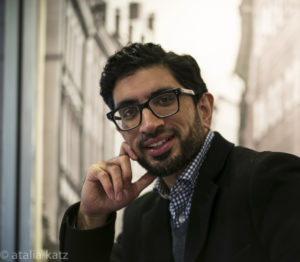
Teaching Osama Bin Laden
Today, Islam is paired with violence so often that these two concepts have become virtually synonymous. Conversations are often wedged between criticisms that Muslims are doing too much violence or not doing enough to stop it. Jihad, the Islamic keyword that has become equated with a distinctively Muslim kind of extremist violence, is complicated, controversial and misunderstood.
The term, jihad, has a long history whose roots return to the beginnings of Islam. Paraphrasing Muhammad: “The small jihad” entails physical combat, primarily defensive, but occasionally pre-emptive; “the big jihad” is the very-human existential struggle to overcome life’s challenges, especially one’s self; and “the greatest jihad” is speaking truth to power. Extremism is something altogether different (or at least it should be).
So I try not to equate jihad with extremism, which I treat as a distinct subject. In my last blog (“Debates: Teaching Controversial Topics in Islam” ), I explained how I devote one class to a student-led debate about ISIS. In the class directly preceding this debate, I teach about Osama Bin Laden, the alleged mastermind behind 9/11 and United States’ friend-turned-enemy. Neither ISIS nor Bin Laden accurately portray Muslim historical perspectives on jihad, but they do represent contemporary examples of Muslim extremists.
I break up my class on Bin Laden into two parts. In the first part of class, we discuss his “fatwas," delivered in 1996 and 1998, which my students have read in translation for homework. We spend more time discussing his 1996 “Declaration of War” against the United States. I have them focus on Bin Laden’s rhetoric: his grievances and justifications for these grievances; his citation of Quranic verses, prophetic traditions (hadith) and Muslim religious scholars; his use of labels such as “Zionist-Crusaders;" and his messaging to specific Muslim audiences such as Arabs and non-Arabs, women and youth.
This rhetorical analysis spurs a number of significant questions: Is Osama Bin Laden’s “fatwa” closer to a political manifesto or religious polemic? Does Bin Laden’s declaration of war constitute jihad? Or does it warrant a different label altogether? What makes it “Islamic?"
Pivoting from these challenging questions, I show them clips from a remarkable interview of Osama Bin Laden conducted by a Syrian-born journalist, Tayseer Allouni, on Al-Jazeera news just weeks after the 9/11 attacks (in Arabic with English subtitles ). Allouni asks Bin Laden probing questions such as (paraphrasing): Have your tactics caused more harm to Muslims in Afghanistan than good? How can you defeat the United States, the most powerful military force in the world?
When entering my class, most students have neither heard nor watched Osama bin Laden speak. After watching clips in class together, I ask what surprised them most about the interview? Every time I teach the course, at least one student mentions his calm demeanor and rational discourse - that he does not appear angry, mad or stupid. Some (non-Muslim) students alarmingly admit that they can understand his point of view. Acknowledging that he does not fit the two-dimensional representation portrayed in the mainstream media is uncomfortable. It is uncomfortable for my Muslim and non-Muslim students (and me too). That it is remarkably easy to confound “Obama” and “Osama” – a verbal gaffe that more than one student in my classes have made over the years – is a not-so-subtle indicator of how easily Self and Other blur into one another. Should it surprise us that Osama bin Laden was once America’s ally?
Before giving Bin Laden too much credit, I intervene and explain how labeling him an “Islamic terrorist” is conceptually problematic. By using language that frames Bin Laden primarily through the lens of religious identity we fail to acknowledge his political ambitions. This insight puts his “calm and rational” demeanor into a different perspective – as a political calculation that strikingly resembles our own. It also helps to explain, why, in the interview, there is remarkably little scriptural (“religious”) content.
Yet Bin Laden’s rhetoric makes it difficult to neatly distinguish between religion and politics. In class, I attempt to explain Bin Laden’s fixation on the “Zionist-Crusader” occupation of and military presence in Jerusalem and Saudi Arabia, which together host three of the holiest sites of Islam – the Kaba in Mecca, the Prophet’s mosque in Medina, and the Al-Aqsa mosque in Jerusalem. I explain how Bin Laden exploits these geographic religious symbols to advance his political agenda and appeal to a global audience of Muslims who revere these powerful symbols.
Examining how Bin Laden configures religion and politics helps students reflect on their conceptual relationship. There is no clear limit where the conceptual domain of religion ends. Instead, it becomes apparent how the domain of the “religious” overlaps with and blurs into the domain of the “political.” The intellectual payoff is that one avoids crudely blaming Islam, the religion, for violence and extremism.
In his Al-Jazeera interview, Bin Laden famously acknowledges that George W. Bush was right: “You are either with us or against us.” In other words, the difference between good and evil is supposed to be clear. It is tribal. Yet, ironically, the statement that is supposed to distinguish Bin Laden and Bush brings them together; they share a starkly black and white binary view of the world. This unexpected resemblance between “us and them” is disturbing. It punctures our sense of difference. Evil is easier to deal with at a distance, not up close. It compels us to realize that our construction of evil is also a reflection of who we are.